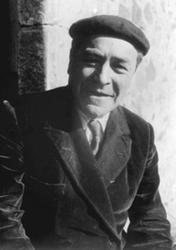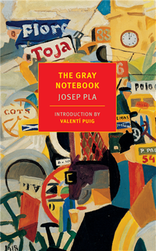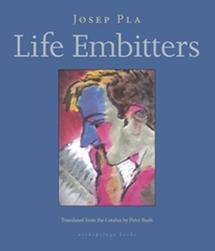
|
|
| Josep Pla | |
The complete works of Josep Pla (1897-1981) comprise more than 30,000 pages and fill 45 volumes, yet it's taken almost a hundred years for any of them to be translated into English. The reason is simple: they're written in the old Iberian language of Catalan, and from 1939 until Franco's death in 1975, the public use of that language in dictator-controlled Spain was prohibited and strictly enforced. Pla was an outspoken news correspondent who was banned from Spain in 1924 for his criticisms of the government, but continued to write about the world from Russia, Rome, Berlin and London, penning not only local lifestyle stories but firsthand accounts of Mussolini's march on Rome and the fall of the Spanish monarchy. He left Spain during the Civil War and was later confined under Franco to the village where he was born, where he continued to write articles that were frequently censored.
 His widely acknowledged masterpiece and the capstone first volume of his collected works is The Gray Notebook (New York Review Books Classics, $19.95), a 600-page tome first available in English in 2014 in a superb translation by Peter Bush. When influenza closed down the university in Barcelona, Pla returned to his little home town of Palafrugell on the Costa Brava, where he began keeping a diary. "I'll write whatever happens--simply to pass the time--come what may," he records in the first entry. Pla began the journal in 1918, on his 21st birthday, and maintained it for 20 months, from the university's closure until he became the Paris correspondent for a Barcelona newspaper in 1919. Fifty years later, Pla went back to his handwritten diary, revising it from the perspective of a mature writer into the autobiographical coming-of-age story of a young man teaching himself to be a writer. As accurately as possible, he recorded life in the country and in the city, introducing his friends--though don't look for any schoolboys here. "All my friends are at least fifteen years older than I am," he said. People his own age put him to sleep or awaken a gleeful, cynical detachment, as in The Gray Notebook's funniest scene where he recorded the dialogue between two young lovers at a romantic seaside tryst interrupted by heartburn, toothache and worries about what the neighbors will say.
His widely acknowledged masterpiece and the capstone first volume of his collected works is The Gray Notebook (New York Review Books Classics, $19.95), a 600-page tome first available in English in 2014 in a superb translation by Peter Bush. When influenza closed down the university in Barcelona, Pla returned to his little home town of Palafrugell on the Costa Brava, where he began keeping a diary. "I'll write whatever happens--simply to pass the time--come what may," he records in the first entry. Pla began the journal in 1918, on his 21st birthday, and maintained it for 20 months, from the university's closure until he became the Paris correspondent for a Barcelona newspaper in 1919. Fifty years later, Pla went back to his handwritten diary, revising it from the perspective of a mature writer into the autobiographical coming-of-age story of a young man teaching himself to be a writer. As accurately as possible, he recorded life in the country and in the city, introducing his friends--though don't look for any schoolboys here. "All my friends are at least fifteen years older than I am," he said. People his own age put him to sleep or awaken a gleeful, cynical detachment, as in The Gray Notebook's funniest scene where he recorded the dialogue between two young lovers at a romantic seaside tryst interrupted by heartburn, toothache and worries about what the neighbors will say.
 Life Embitters (just released by Archipelago, $18), the sixth volume of the complete works and the second to be available in English, is another 600-pager in another excellent translation by Bush. This one collects 24 short narratives, half of which could be called short stories except that they're really journalism. Pla wrote almost exclusively nonfiction. To write fiction one needs imagination, and "I've never been at all imaginative," Pla famously confessed. Are these frequently delightful pieces the unvarnished truth? Only Pla knows. True life presented with the techniques of realistic fiction became Pla's genre-bending form of choice. Perpetually traveling, never living anywhere for long, Pla engaged with fellow boarders and travelers in one-time-only conversations in taverns and trains, which he then transcribeed into literature.
Life Embitters (just released by Archipelago, $18), the sixth volume of the complete works and the second to be available in English, is another 600-pager in another excellent translation by Bush. This one collects 24 short narratives, half of which could be called short stories except that they're really journalism. Pla wrote almost exclusively nonfiction. To write fiction one needs imagination, and "I've never been at all imaginative," Pla famously confessed. Are these frequently delightful pieces the unvarnished truth? Only Pla knows. True life presented with the techniques of realistic fiction became Pla's genre-bending form of choice. Perpetually traveling, never living anywhere for long, Pla engaged with fellow boarders and travelers in one-time-only conversations in taverns and trains, which he then transcribeed into literature.
His unflinching determination to capture reality in words, without superstition or sentimentality, is coupled with a young writer's glee at making language do the job. Pla described everything that crossed his path--the landscape, the weather, steaming platters of food, nearby dogs and cats, whatever his writerly eye singled out for study. In particular, he enjoyed probing the mysterious, perpetually changing relationship between lonely, mature ladies with rooms to sublet and their insecure, insolvent, hot-tempered bachelor lodgers. He can introduce the reader to a Berlin drawing-room full of artists and intellectuals, one by one, or describe his friends touring the art world of Florence, statue by statue. Pla's voice is the reason the reader can't stop reading; this candid and sensibly pragmatic young writer is irresistibly charming.
Pla loved people and honest conversation. His ear for dialogue is faultless, his snatches of overheard conversation are meticulously realistic--the comments of children, the grumblings of old fishermen, the cherished beliefs of elderly spinsters, the banalities of the rich, the sappy absurdities of young lovers. A man asking his Italian barber what his girlfriend meant when she called him an homme fatal became in Pla's hands the comic centerpiece of a tale he fleshed out skillfully into a delightful character-driven vignette. The tone of the stories is often a bubbling good humor, as in "The Boarding House on Cambridge Street," where the narrator's thin walls in London allow him to overhear the enigmatic conversations of "a young lady who acts in good faith." A penguin in a London park casually munching an unfortunate sparrow leads to a passionate questioning of God's punishments in "A Conversation in St James Park."
His topics--like those of Montaigne, his hero--consist of anything he's pondered at length, ranging from a rectory dog, a watchmaker's shop, capitalism, kites, sardines, tortoises, alcohol, the sea, immortality, human solitude, all the way to fatness as an index of character. He meditated on his own physical appearance, particularly his broken nose. His style is so bluntly honest that his friends perpetually assumed he was teasing.
Pla believed that "a writer has an overriding responsibility toward the era when he is living. A writer's first duty is to observe, relate, and portray this era." That's exactly what Pla set out to do, and does brilliantly. His vibrant immediacy makes him sound utterly current. It's modern journalism dawning a century early, with a sharp-eyed reporter who described the world exactly as he saw it. The result is sparkling wit, keen observation, stinging irony and a symphonic control of language with a young author's headlong approach to experience. The reader happily abandons any hope of plot or character, enjoying just being in the company of this boldly honest young commentator on life. --Nick DiMartino, Nick's Picks, University Book Store, Seattle, Wash.

